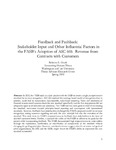Feedback and Pushback: Stakeholder Input and Other Influential Factors in the FASB's Adoption of ASC 606- Revenue from Contracts with Customers (thesis)

Author
Orsak, Rebecca L.
Subject
Washington and Lee University -- Honors in Accounting
Financial Accounting Standards Board
Revenue
Accounting -- Standards
Metadata
Show full item recordDescription
Thesis; [FULL-TEXT RESTRICTED TO WASHINGTON AND LEE UNIVERSITY LOGIN] Rebecca L. Orsak is a member of the Class of 2018 of Washington and Lee University. Available files include a timeline as well as an Honors Thesis. In 2002, the FASB took on a joint project with the IASB to create a single, comprehensive standard for revenue recognition. ASC 606 replaced the earnings-based model of recognition that, in practice, could lead to inconsistent, incomparable, rules-based reporting. Users and producers of financial reports raised concern about the new standard (specifically that the five-step process did not adequately apply to all industries and practices). The FASB had two main goals in mind when creating the standard: movement towards principles-based reporting and convergence with international standards. However, feedback from stakeholders challenged the FASB's proposed model for revenue recognition, raising concerns regarding not only the new principle but also the execution of the standard. This study tests the FASB's responsiveness to feedback from stakeholders in the form of solicited comment letters. Further, it assessed the ability of the FASB to adhere to its goals for the project while incorporating feedback. The FASB demonstrated high responsiveness to stakeholders through the explanation, clarification, or modification of components of the standard without changing the guiding principles. However, anecdotal evidence suggests that the structure and goals of
other organizations, the SEC and the IASB, might thwart the FASB's ability to implement the new standard as intended.